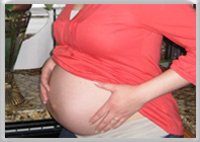Breastfeeding While Pregnant: Is It Safe?

Breastfeeding while pregnant is generally safe. In fact, getting pregnant while breastfeeding may be more of an issue. Menstruation after pregnancy signifies return of fertility and makes another pregnancy possible even if the woman is still breastfeeding.
Breastfeeding during pregnancy is surrounded by a number of myths and some misinformation. Up until recently doctors were still recommending weaning during pregnancy.
Nowadays, pregnancy and breastfeeding are not mutually exclusive. But there are several aspects to consider when deciding about breastfeeding while pregnant.
Nutrients and Vitamins
Ten-fifteen years ago and still today in some countries of the world doctors
recommend weaning the older baby from the breast instead of breastfeeding while pregnant.
Many argue that a woman's body rushes all the necessary nutrients to the milk glands to produce breast milk. Therefore, there may be little left for the fetus.
However, your body is smarter than that. Exclusive breastfeeding prevents you from becoming pregnant during the first 6 months of your baby’s
life. Read about Breastfeeding As Birth Control. After the first 6 months, you will need to consider various birth control options.
If you get pregnant when your baby is 6 months old, he/she is already on solids. And your milk supply usually drops during the first weeks of pregnancy. So you don’t need that many nutrients to produce milk and there is more left for your developing fetus.
If you do become pregnant sooner than 6 months after delivery, it is still safe to continue nursing. You just have to eat a healthy breastfeeding diet, take your prenatal vitamins and let your doctor watch your weight gain closely.
When your new baby arrives, or even prior to this, your mature milk will start changing to colostrum. Your newborn will get all the benefits of it. In fact, even a couple of months before the due date, your milk will turn from sweet to a slightly salty taste and from white in color to more colostrum-like yellowish.
This is nature’s way of giving your older child a chance to wean. Many children
dislike the new taste and self-wean, but some don’t mind it. Then you will just have to breastfeed an older sibling and a new baby. This process is called tandem breastfeeding. Either way – go with the flow.
Your pediatrician should also watch your older baby’s weight during pregnancy. If your milk supply drops, there is a chance that you may need to supplement. But let your doctor decide. It is hard to combine being a breastfeeding mother and a pregnant woman, but it is possible and with all the benefits of breast milk, it is totally worth a try.
In addition, if you do tandem nursing, it will make the adjustment process easier for the older child. Of course, you will have to establish rules as to who nurses when, since the new baby should be your priority in terms of breastfeeding.
Another advantage of tandem nursing is that your older child's sucking will help stimulate milk production, so you will never have a shortage of breast milk for the little one.
Oxytocin
Oxytocin is responsible for milk let-down. Another role of oxytocin is helping uterus get to its pre-pregnancy form by means of stimulating uterine contractions.
It was once believed that these uterine contractions can induce labor and cause miscarriage. It is, however, known that the uterus doesn’t react to oxytocin till about 20-24 weeks into pregnancy.
During the second half of pregnancy, breastfeeding is still considered safe, if there are no pre-conditions forbidding it, if your doctor recommends it and if there were no prior miscarriages or premature births.
Nipple Sensitivity
Some women consider weaning their older child when they get pregnant due to the increased nipple sensitivity and soreness. It can indeed turn breastfeeding into an unpleasant experience. Some women report feeling anxiety, uneasiness, unbearable discomfort, and extreme tenderness in the breasts.
If you feel that way after comfortably breastfeeding for many months, it may be one of the signs of pregnancy while breastfeeding. But there are other reasons why nipples can become sore.
If your nipple sensitivity becomes extremely uncomfortable and your older child is on solids, consult your doctor or lactation specialist about weaning. Changed taste of breast milk may make your older child less fond of nursing anyways.
Give these three aspects of breastfeeding while pregnant a thought, decide for yourself and work out a breastfeeding plan. And remember, breast milk is the ideal food for babies.
Home › Breastfeeding & Pregnancy
















